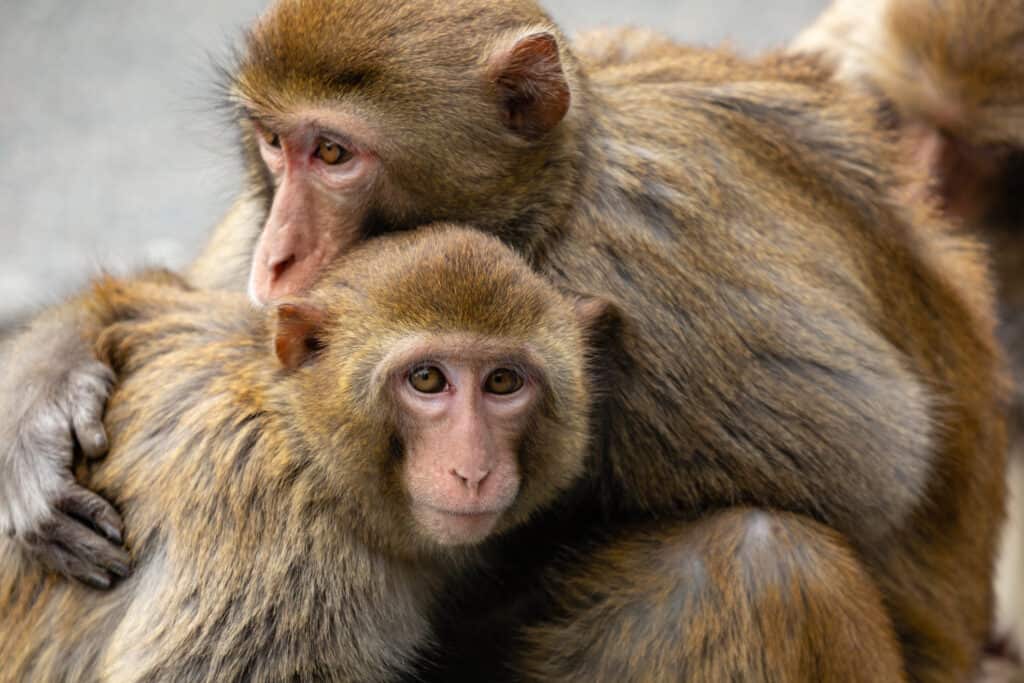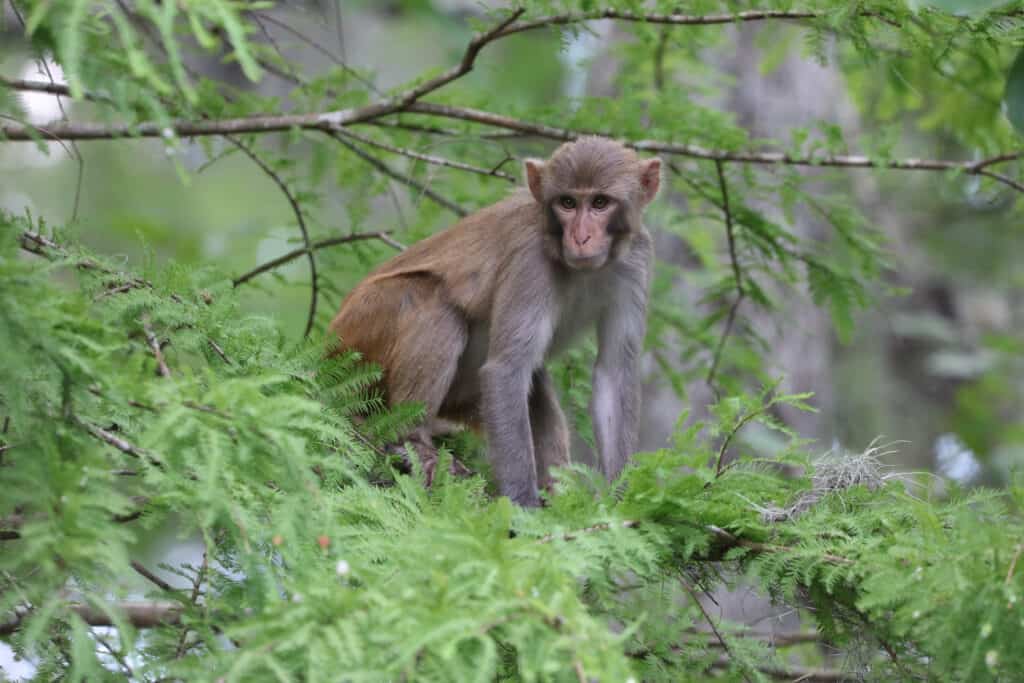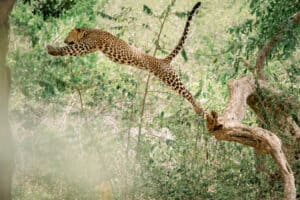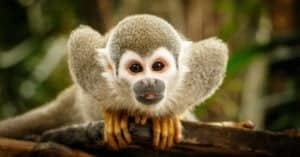There’s an unusual threat to people visiting Silver Springs State Park.
The Floridian park is home to a thriving population of rhesus macaques. These are monkeys native to the Middle East and Asia, which means they’re an invasive species in the lush forests of Florida.
Their impacts on the native wildlife of the park are significant, but the craziest part has nothing to do with their new roles in the ecosystem. Rather, the most troubling aspect for humans is that these monkeys have transmissible herpes.
More specifically, 25% of the sample population had herpes B. This is a variety of herpes that can cause fatalities in humans, and some of the monkeys spread the disease orally. So, if a monkey were to bite you, you could contract a fatal disease.
Rhesus Macaques in Florida
So, if these monkeys are native to other continents, why in the world are there 400 diseased macaques roaming Florida?
It all started with tourism in the early 20th century. Back in 1930, Florida was just blossoming into the tourist hub that it is now. More people had the finances to travel, so they wanted to explore different parts of the country.
Florida was one of the first places to host “glass-bottom boat tours” which included a see-through panel for visitors to appreciate marine life through. Silver Springs, specifically, had very clear water, making the park a perfect place to utilize glass-bottom tours.
One operator named Colonel Tooey was bent on drawing tourists to his boat. He had a theory that releasing monkeys into the wild would draw visitors who had never seen them, making it a lot easier for him to sell boat rides.
So, that’s what he did.
Colonel Tooey released a handful of rhesus macaques into Silver Springs State Park and left them there. He and other boat operators would draw the monkeys in with food and dazzle visitors.
Word spread, tourists were more interested in the park, and Tooey started making more money. As a result, he released another handful of monkeys into the wild.
Those 10-15 monkeys were the base population for the 400-plus individuals who live in the park now. They’ve spread hundreds of square miles and there might be divergent populations in adjacent areas.

A glass-bottomed boat operator released a small number of rhesus macaques in Silver Springs State Park to draw in tourists.
©iStock.com/Zane Michael Cooper
The Tarzan Myth
One interesting legend about Florida’s macaques is that they were released during the making of Tarzan Finds a Son! in 1939. While this myth is a little more glamorous than the greed of a swarthy glass-bottom boat operator, it’s not true.
Macaques weren’t used in the making of the film.
Why Do They Have Herpes?
Interestingly, macaque monkeys are the primary source of the herpes B virus. According to the CDC, “B virus infections in people are usually caused by macaque monkeys.”
These monkeys are believed to be the original bearers or “natural hosts” of this particular variety of herpes. Primates have passed different kinds of herpes back and forth to one another for an extremely long time—millions of years, in fact.
The first transmission from chimps to human ancestors is believed to have occurred around 1.6 million years ago. This was around the time that Homo erectus developed hand axes and started building fires.
Herpes viruses have adapted and mutated throughout the course of time, leading to the 130-plus herpesviruses known to date. It’s estimated that well over half of the earth’s human population has contracted some form of herpes virus.
Chickenpox and shingles are caused by the herpesvirus HHV-3, for example. On a different branch of the tree of life, the B virus evolved and found its current home in macaque monkeys.
Is the Herpes B Virus in Humans?
Fortunately, human-to-human transmission of this virus is almost non-existent. You wouldn’t contract herpes B from any type of normal interaction with a human being.
In fact, there aren’t any reported instances of humans contracting herpes B from macaques in the wild. The virus is spread through contact with bodily fluids (scratches, bites). Although humans have been attacked and scratched by wild macaques, there’s no indication that these people got the virus.
More than 50 researchers have contracted the virus while working with macaques in labs, though. Of those infected, nearly 50 percent died.
Herpesvirus B is incredibly dangerous to humans. Unlike its milder cousins that produce cold sores or debilitating shingles, the B virus will almost certainly cause lasting damage or lead to death.

It’s unlikely that you would be bitten by a macaque during a trip to Florida, though these primates can be aggressive towards people.
©Mel Kowasic/Shutterstock.com
Headed to Florida Any Time Soon?
This all begs the question, should you go to Florida and risk getting a deadly virus?
Silver Springs State Park still boasts glass-bottom boats as one of its main attractions. These boats glide over crystal clear waters and put the spotlight on a healthy breadth of wildlife including alligators, large snakes, beautiful freshwater fish, and more.
You might even get to lay your eyes on a few macaques which might be a little scary because they’re excellent swimmers. You could see them rain down from the trees, clunking into the water and making their way toward your boat!
This is unlikely, though. Plus, it’s even less likely that they would board your glass-bottom boat and proceed to attack you. The monkeys have been in the area since well before it became a state park, and millions of people have since walked, boated, and camped in the park safely.
Will the Monkeys Attack?
Now, just because the monkeys don’t tend to attack people doesn’t mean they won’t.
State parks are a refuge for wildlife. The same goes for national parks, and these areas are home to wild animals that do what wild animals do. Many national parks are rife with signs and warnings about grizzly bears, mountain lions, aggressive bison, moose, rams, and more.
Macaques are clever, capable little primates. In fact, they’ve even scored higher than humans in certain task-based studies. One study asked humans, rhesus macaques, and capuchin monkeys to follow a set of rules to complete a task.
There was also an advantageous shortcut that none of the participants were made aware of. Most of the macaques immediately took the shortcut, whereas only two percent of humans did so.
A Modern Example
A population of macaques has been terrorizing residents in Yamaguchi City, a region of south Japan. More than 45 attacks have popped up this summer (2022) and the authorities are sure that there are numerous culprits.
There are reports of these monkeys sneaking into windows and latching onto people. This is unprecedented, and experts think it’s due to conservation efforts that have bolstered the macaque population, which is native to that area.
Not only are they smart, but they run in troops ranging from 20 to 50 individuals. They work within a complicated social structure, and their lifespans extend upwards of 30 years, giving them plenty of time to assess and respond to the behavior of Floridian tourists.
Tourists have food in most cases, and that’s something that most wildlife wants. In the course of getting food or inspecting a group of humans, there’s plenty of room for things to go wrong.
That doesn’t mean things will go wrong, though. You just have to be respectful of the animals in the same way you’d be respectful of a large alligator laying on the side of the trail.
Don’t feed the macaques, and certainly don’t antagonize them. If you can manage that, your chances of having a negative encounter are very small. Plus, it’s encouraging to know that no human has contracted herpes B from a wild macaque.
What’s Up Next?
- Monkey Teeth: Everything You Need to Know
- The World’s 10 Largest Monkeys
- Discover the 9 Animals that Build Things Like Humans Do
- 9 Animals That Use Tools (This is Amazing!)
The photo featured at the top of this post is © Blueton/Shutterstock.com
Sources
- Slate, Available here: https://slate.com/news-and-politics/2007/10/what-to-do-if-you-re-attacked-by-monkeys.html
- The Science Times, Available here: https://www.sciencetimes.com/articles/24089/20191017/capuchin-rhesus-monkeys-show-better-cognitive-flexibility-humans.htm
- ABC 15 Arizona, Available here: https://www.abc15.com/news/national/family-attacked-by-wild-monkeys-at-floridas-silver-springs-state-park
- Primates Park, Available here: https://www.primatespark.com/silver-springs-monkeys-florida/
- WHO, Available here: https://www.who.int/news/item/01-05-2020-massive-proportion-world-population-living-with-herpes-infection
- Smithsonian, Available here: https://www.si.edu/newsdesk/factsheets/milestones-human-evolution
- Ancient Origins, Available here: https://www.ancient-origins.net/news-evolution-human-origins/fire-0014161
- Live Science, Available here: https://www.livescience.com/3996-humans-chimps-split.html
- University of Florida, Available here: https://edis.ifas.ufl.edu/publication/uw412
- The Guardian, Available here: https://www.theguardian.com/environment/2019/dec/30/florida-monkeys-herpes-macaques
FAQs (Frequently Asked Questions)
What kind of monkeys live in Florida?
All primates in Florida were introduced to the region by humans. Florida hosts squirrel monkies, green monkies, the infamous macaques, and more.
What do I do a monkey shows aggression?
If you’re in Silver Springs State Park and a macaque monkey starts to bother you, there’s an easy solution. Just do your best to give them whatever they’re after.
In the process of appeasing them, don’t look at them in the eyes or bare your teeth in any way.
In almost all cases, they’re after your food. So, take your food out, throw it as far as you can in the opposite direction, and they’ll likely leave you alone. You can then walk away slowly.
If you’re not hanging onto a snack, display the fact that you don’t have anything with you. Remember, macaques are smart and will recognize what you’re doing. Open your hands and show that you’re not holding anything.
Why are there macaques in Florida?
A handful of macaques were released by boat captain Colonel Tooey in the 1930s. His intention was to drive tourism by hosting exotic monkeys in what is now Silver Springs State Park.
The monkeys populated and spread throughout the area, persisting to this day with many carrying the herpes B virus which can be deadly to humans.
Thank you for reading! Have some feedback for us? Contact the AZ Animals editorial team.






